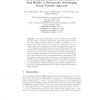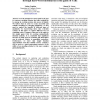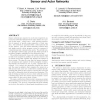36 search results - page 7 / 8 » Evolving Controllers for Autonomous Agents Using Genetically... |
160
Voted
EWLR
1999
Springer
15 years 7 months ago
1999
Springer
In the field of evolutionary robotics artificial neural networks are often used to construct controllers for autonomous agents, because they have useful properties such as the ab...
124
Voted
CEC
2010
IEEE
15 years 3 months ago
2010
IEEE
For any embodied, mobile, autonomous agent it is essential to control its actuators appropriately for the faced task. This holds for natural organisms as well as for robots. If sev...
162
Voted
GECCO
2010
Springer
15 years 2 months ago
2010
Springer
This paper takes an economic approach to derive an evolutionary learning model based entirely on the endogenous employment of genetic operators in the service of self-interested a...
146
Voted
CIG
2005
IEEE
15 years 8 months ago
2005
IEEE
Several attempts have been made in the past to construct encoding schemes that allow modularity to emerge in evolving systems, but success is limited. We believe that in order to c...
145
Voted
MOBIHOC
2008
ACM
16 years 2 months ago
2008
ACM
Sensor networks are expected to evolve into long-lived, autonomous networked systems whose main mission is to provide in-situ users ? called actors ? with real-time information in...



